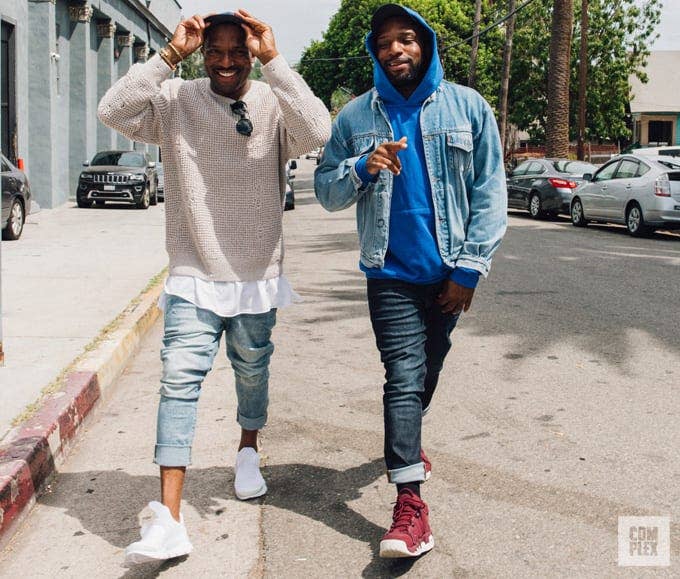Taiwo Hassan kept getting fired. Living in New York City, he was running a familiar hustle—by day, he was a buttoned-up, Brooks Brother-suited investment banker fresh out of college advising Chase Bank patrons on mutual funds and annuities. But at night, he and his identical twin brother (and fellow banker) Kehinde were providing a different sort of customer service: Stripping off their silk ties and wingtips, they became Christian Rich, a production duo quickly becoming known for the classy, eclectic range of music–from rap and electronic to global dance and jazz–they played at rooftop parties and industrial warehouses across the city.
Customers might’ve been intrigued by the twins’ Superman act. But their managers were not thrilled with their constant requests for time off, and the guys were frustrated they were still saddled with day jobs. But serendipity was at work in those stuffy offices—at his gig, Kehinde met a woman who eventually introduced him to the Atlanta producer Bangladesh. And at his bank in Harlem one afternoon, Taiwo was complaining to a woman related to production outfit the Soul Diggers.
“She was like, ‘You should quit this job and believe you’re gonna sell your beat for $10,000.’ That was the goal back then,” an incredulous Taiwo, 35, says now in Los Angeles. He fishes around in a bag of Doritos, hungry after his morning workout. The brothers’ faces are round—later, he’ll point to a photo and say, “I look like a chubby guy here, but I’m skinny underneath.” Beneath their studied layered-comfy fits, their bodies are lean. They’re unassuming and open, with a quiet confidence they wear like a second skin.
“I listened to her and quit my job,” he continues. “It was almost like angels kept coming over and saying [to us], ‘Stop doing this, you’re supposed to be doing this.’”
They were wise to heed to whoever was whispering in their ears. Since taking the leap to making music full-time in the early 2000s, they quickly placed a beat on Lil’ Kim’s 2003 album La Bella Mafia and have gone on to work with Chris Brown, Childish Gambino, and J. Cole, among others. They produced one of Earl Sweatshirt’s biggest hits, the melancholic, piano-driven “Chum,” and the sinister lead single from Vince Staples’ debut, “Senorita.” They count Pharrell Williams and Shay Haley of N.E.R.D as mentors and friends and have collaborated with Diddy and Jay-Z. Their 2015 debut album, FW14, is subtly textured and was critically praised, they’ve toured around the world as DJs and recently relocated to Berlin to concentrate on designing. But the music industry had other ideas—they’d only been gone a couple of months when they discovered they had yet another hit on their hands with Staples’ sleek, trapped-out “Big Fish.”
Despite their in-demand status as producers, it’s no wonder the guys are itching to venture into other creative enterprises—they grew up just as passionate about drawing and designing as they did digging in their father’s girlfriend’s crates of soul vinyl.
“When we left, we were branching out to do our own business,” says Kehinde. “Still doing music, but it wasn’t on the forefront. But within two or three months, Vince’s team called and said, ‘Your song is gonna be the single.’ So much for being low-key and chill…” He trails off, chuckling.
“We wanted to go more in the direction of our earliest creativity,” explains Taiwo. “When we were younger, we both could really draw.”

Born in Chicago, the boys grew up curious and creative. At nine, Taiwo says he sent a sketch to Nike and later, after receiving a letter thanking him for his submission, saw his design on the Nike Unlimiteds. (“I showed my dad and he said, ‘Stop drawing, you’re gonna be a lawyer.’ Nigerian parents,” he says, shaking his head affectionately.) The boys were four years old when their father, who has his PhD in mechanical engineering, relocated the family to his native Nigeria for a job. The gig fell through, but their father decided to stay in order for the kids—the twins and their two sisters—to experience his culture. Soaking up language with children’s sponge-like brains, Taiwo and Kehinde soon spoke Yoruba fluently and used it to brag to their buds that their dad had a Casio keyboard. When they returned to the States four years later, they were fascinated by it.
“At that point, we could’ve learn to code. We could’ve become Zuckerberg or Christian Rich,” says Kehinde without a trace of irony. “I don’t feel we ever learned how to produce, we just did it.”
Listening to Dr. Dre, Snoop Dogg and A Tribe Called Quest introduced them to jazz and sampling. In addition to her record collection, their dad’s girlfriend had a tape player that they used as a one track. After recording beats off the radio, they’d sample them and use another broken tape player to scratch, teaching themselves to loop the analog way.
“We didn’t realize what we were doing was pioneering,” Taiwo says. “There was no example. We thought, we should go to someone and get them to teach us beats. But it never happened. All the time we were waiting for someone, we were learning by default.”
While attending the University of Illinois Urbana-Champaign to appease their dad (“Speech communications. It’s a major sports dudes get,” Kehinde says with a grin), they dug in even deeper into making beats, even if they didn’t take it super seriously. But then they sold their first beat for $250. They sold another for $300. At a hack seminar for A&Rs in Chicago, they met a guy who happened to actually make decisions for Bad Boy Records. He asked the guys to send him some beats, and the first one they sent ended up on Lil’ Kim’s album. Christian Rich, a name inspired by Christian Dior, was born.
In Berlin, however, the guys hope to refocus their energy on fashion. They already have a line of pricey sunglasses and hope to expand further based on their own style. It’s much cheaper to live there than L.A., where they were for a handful of years prior, but they say their move was much more about their minds than their money.
“A lot of people probably make $700 a month, but they live like gods. Half the town is in Ibiza right now,” says Taiwo.
“They enjoy their experiences,” Kehinde echoes. “It’s a mindset. Not so focused on capitalism.”
“No one judges you on what you have. They really can’t stand when people have Porsches even though that’s an export and helps their GDP,” Taiwo continues.
That attitude meshes well with the brothers’ current ethos.
“Design has always been such a relief to us. Liberating,” Taiwo says. “We feel like kids again. I’m waking up at 3, 4 in the morning, saying, ‘Look at this!’ It’s like being 8 or 9 again. That’s where I think the true genius is.”
In Berlin, they have the freedom, both financially and mentally, to dive into their preferred mode of wide eyed curiosity in every way possible. Being self-employed can be stressful, but they’ve always survived by creating. And hey—nobody can fire them.

